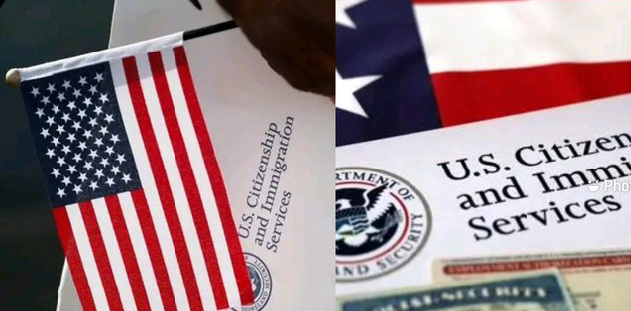
U.S. Department of Justice (DOJ) Quietly Begins Revoking Citizenship

In a move that has sent shockwaves across immigrant communities and civil rights organizations, the United States Department of Justice (DOJ) has begun quietly revoking U.S. citizenship from individuals who were previously naturalized, stirring fears and igniting intense public debate about due process, national identity, and the power of the state.
The actions, which have flown under the radar for most Americans, mark a renewed effort by the DOJ’s Office of Immigration Litigation to enforce a legal tool long enshrined in U.S. law but rarely used: denaturalization. The legal process allows the government to strip someone of their citizenship if it is found to have been obtained fraudulently or illegally. But critics argue that this practice, once considered a rare and extreme measure reserved for war criminals and serious national security threats, is being dangerously expanded and used in ways that could affect thousands of people who have built lives in America for decades.
The DOJ’s quiet surge in denaturalization efforts was first noticed by immigration attorneys in early 2025, who began reporting an uptick in federal court filings targeting individuals from countries like Pakistan, India, Nigeria, and Mexico. Many of these individuals were accused of small discrepancies in their original immigration paperwork, some dating back over 20 years. One such case involved a man who failed to disclose a prior asylum application in a different name—a clerical omission his attorney claims was made by a translator and not intentional deception.
Civil liberties groups are sounding the alarm, saying these moves set a dangerous precedent. “We are seeing a weaponization of paperwork,” said Ravi Singh, legal director of the Immigrant Justice Alliance. “If your entire life in America can be unraveled because of a minor mistake or something you didn’t understand years ago, then no one is truly safe.”
What makes this new wave of denaturalizations especially troubling to advocates is the scope. The DOJ has resurrected a task force previously created under the Trump administration known as the “Denaturalization Section.” Though the Biden administration initially distanced itself from the task force, officials now insist that the current wave of cases is strictly targeting “egregious fraud.” Yet in practice, the line between egregious and technical has blurred.
One woman, a naturalized citizen originally from Ghana, is currently facing denaturalization proceedings for allegedly failing to disclose a previous marriage on her visa application in 2002. She has lived in the U.S. for over two decades, raised three children, and never committed a crime. The idea that she could be stripped of her citizenship and deported to a country she no longer knows has left her family devastated.
Even more disturbing to some is the lack of clear public accountability or transparency in these cases. Many proceedings are handled in federal court but fly under the media’s radar. The individuals targeted often have limited access to legal resources and little understanding of the complex legal labyrinth they are suddenly thrust into. Once a denaturalization case is won by the government, deportation can follow swiftly, with limited opportunity for appeal.
The DOJ’s defenders argue that the United States has a right—and a duty—to uphold the integrity of its immigration system. “Citizenship is not a right to be given lightly or fraudulently,” said one DOJ official who requested anonymity due to the sensitivity of the program. “If we don’t enforce the rules, we undermine the entire legal process by which people become Americans.”
But for immigration advocates, the question is not whether fraud should be punished. It is about proportionality, fairness, and the message these cases send to millions of naturalized Americans. “This creates a chilling effect,” said Maria Lopez, director of policy at America United for Immigrant Rights. “It sends a message that even if you’ve done everything right, you’re never truly secure.”
That chilling effect is already being felt in immigrant communities across the country. Naturalized citizens are suddenly revisiting their paperwork from decades past, afraid that some forgotten error or omission could be used against them. Some are even avoiding travel or legal action out of fear they could be flagged for review. The psychological toll is immense. For many, the revocation of citizenship is not just a legal matter—it’s an existential crisis.
In a country where citizenship is often seen as the ultimate form of belonging, the idea that it can be taken away so quietly has sparked comparisons to authoritarian regimes where nationality is a privilege granted at the whim of the state. Legal scholars warn that this could represent the beginning of a new phase of American nationalism—one that treats certain citizens as perpetually probationary.
“This goes beyond immigration,” said constitutional law professor Dr. Ellen Gates. “This is about the fundamental nature of citizenship. Is it something that belongs to the people, or something the government can give and take away at will?”
As the debate grows, calls for congressional oversight have begun to emerge. Several members of the House Judiciary Committee have requested data from the DOJ on how many citizenship revocations have been initiated since January 2025, and under what criteria. There are also early signs that a bipartisan coalition may form to push for reforms to denaturalization laws, including stronger protections for due process and time limits on how long after naturalization the government can challenge a person’s citizenship.
But for now, the government presses on. Cases are being filed, judges are ruling, and lives are being overturned—all while the broader public remains largely unaware. In a political climate already defined by suspicion and division, the revival of denaturalization efforts may become one of the most consequential and least-discussed developments in modern American civil rights.
As the DOJ continues its campaign, many naturalized Americans are left wondering whether they truly belong in the country they now call home—or whether, in the eyes of the state, they always were and always will be foreigners with paperwork.


